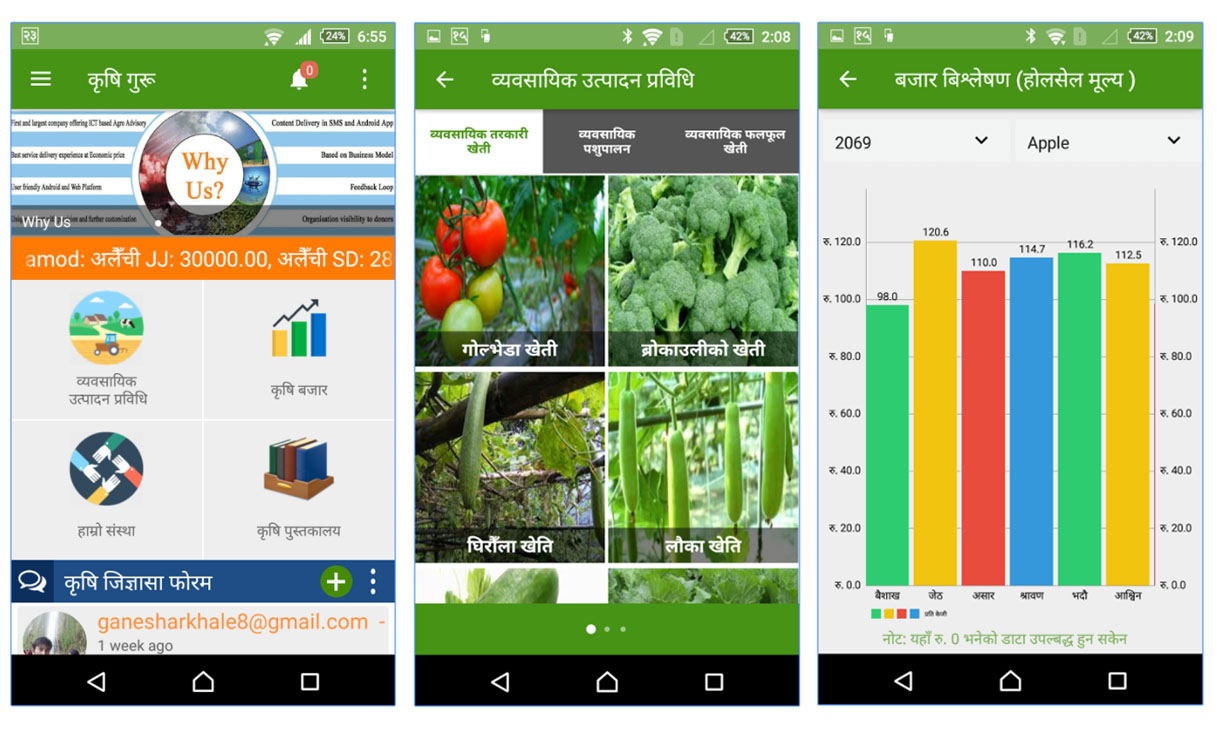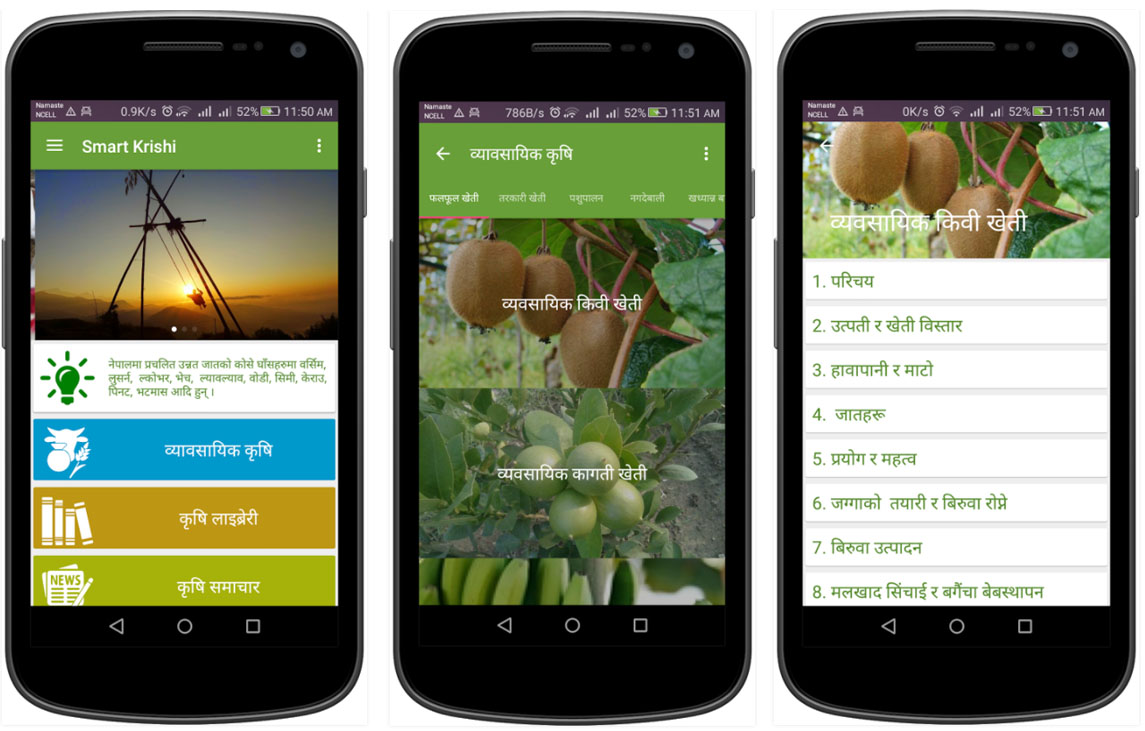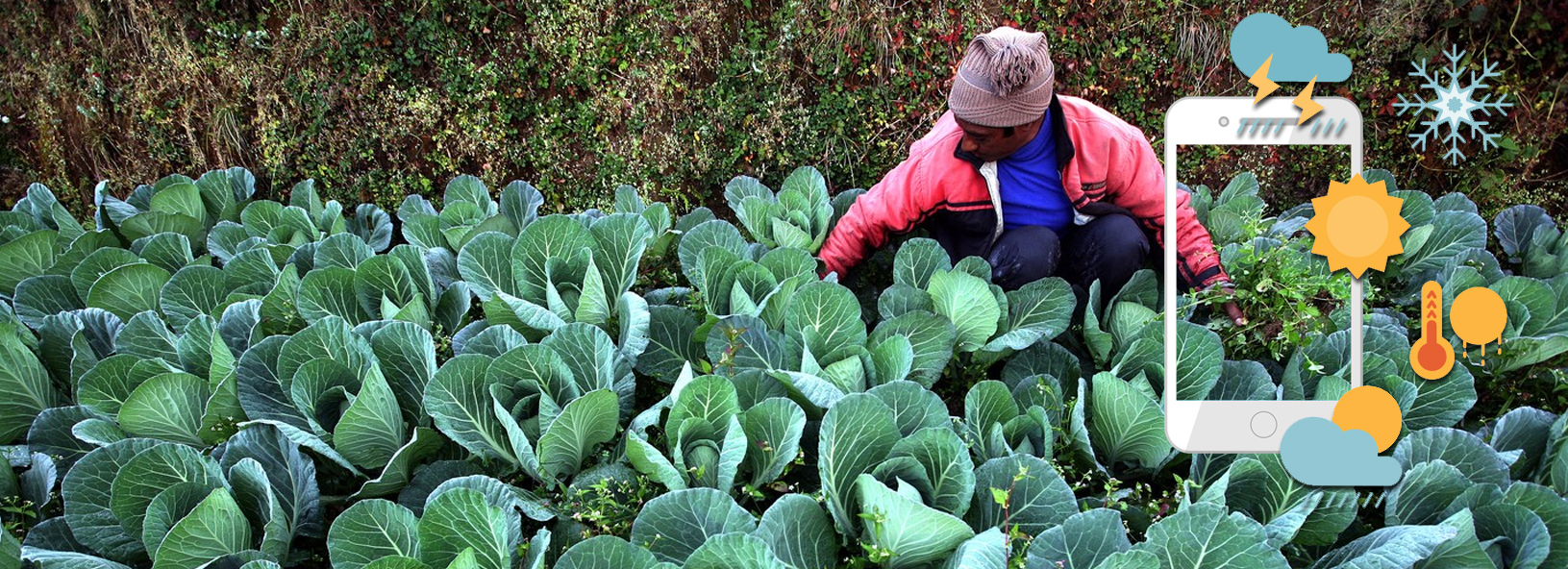Nepal is an agricultural country, with more than half of the country directly engaged in farming. The agriculture sector is an important but underdeveloped sector. Of the 12 million people who rely on agriculture as their main income source, 60% cannot produce enough crops to feed themselves for the whole year.
With tricky topography, poor infrastructure and lack of access to resources and markets, Nepal’s agriculture sector faces a lot of problems. Information gap is one of the major of limitations that is holding back Nepali farmers.
Agricultural productivity can improve if farmers get up-to-date information on weather patterns, soil content, seeds and fertilizers, diseases and pests, pricing and marketing. Climate change necessitates even more urgent access to information as familiar benchmarks for making agricultural decisions such as the timing of rains and the duration of dry intervals are increasingly less reliable.
Nepal Government along with various NGOs, INGOs and researchers regularly generate agricultural data. However, most Nepali farmers do not have access to that information. Information and Communication Technology (ICT) can play a crucial role in filling this information gap. In this article, we explore some representative ICT initiatives that are trying to solve the challenges in agriculture of Nepal.
GeoKRISHI
GeoKRISHI is a mobile and web-based application that disseminates agriculture-related data. It integrates satellite data with government and crowd-sourced information and makes automatic evaluations of crop suitability by using scientific methods and illustrates the results in a simplified form.
GeoKRISHI mobile app can be used by the farmers to find information at the farm-level for crop productivity, while agro-enterprises and cooperatives can use a web version to find information at the sub-national/community level.
When a farmer registers with her mobile number, the app generates location specific information through the phone’s GPS. Farmers can get various information such as what crops she can grow in her area, in which months she can grow them, when she’ll be able to harvest them, and how much money she can gain from the harvest. It also provides various technical information on growing crops.
GeoKRISHI was developed in March 2017 by Rajan Bajracharya, in collaboration with his technological partners Pathway Technologies and Services. GeoKRISHI won the Global Data-Driven Farming Prize, along with an award of US$ 100,000. GeoKRISHI has also collaborated with the Ministry of Agricultural Development to release crop-suitability charts. GeoKRISHI’s larger goal is to set up GeoKRISHI-powered advising centres in many of the country’s agricultural hubs.
In M&S interview, Rajan Bajracharya says:
“The number of people using smartphones in Nepal is increasing every year and internet penetration in rural Nepal has quadrupled over the last few years. Many Nepali farmers own smartphones–which is all that’s actually needed to access information that’s there on the internet; but we noticed that most of them get overwhelmed by the unstructured information available online, and many of them lack the knowledge and tools to filter out irrelevant and redundant information. Through GeoKRISHI, we’re trying to ensure that all the disorganised, multi-sectoral data available is made good use of. The app automatically analyses the data it is fed and presents to its users meaningful and comprehensible information.”
Krishi Guru (ICT for Agriculture)
Krishi Guru is a mobile application providing localized information on crops, weather forecast, agriculture news, fertilizer calculation, pests, diseases and remedies. It also provides facility to post instant inquiries in farmer forum and get solutions from experts, find market price and trader information of various markets. The farmers can also select a particular vegetable market and witness live trading prices, and contact the market seller directly. Farmers can also get notifications of opportunities posted by government and non government organizations. It generates content from various publications of the National Agriculture Research Centre while market prices are updated through the major agriculture centers of Kathmandu and neighboring districts.

In GlocalKhabar interview, founder Siban Chaulagain says:
“After graduating Electronics and Communication Engineering in 2011, I went back to my village in Sindhuli to setup solar-powered computer labs in schools and help villagers learn computer. I was working with a dream to take wireless internet in villages, in a similar way Mahabir Pun did. During those 2 years in my village, I also worked with my parents in the field and there, I witnessed how the lack of information on pest disease, weather, available market, and input supplies made farming life difficult. I saw these problems from an engineer’s eye. So, we developed an SMS based application and Mobile Application to help farmers provide this information whenever they demand.”
Krishi Guru is part of the wider ICT for Agriculture (IFA) project, which has been developed by SMILE in collaboration with the US Embassy in Nepal. The app developers initially received a grant of US$ 8,000 in 2013 to build an SMS-based system to provide agricultural information to farmers, which later evolved to IFA Krishi app (rebranded as Krishi Guru). Krishi Guru won US$ 50,000 in the Data Driven Farming Prize. They were also declared Category and Grand Winner-Ncell App Camp 2014, Nepal Winner in ReConnect Challenge, ICT for Mountain Development Award, by ICIMOD, and runner-up in World Summit Youth Award 2015.
Smart Krishi
Smart Krishi is a mobile application for farmers with agricultural information such as high value crops, types of soil, improvised seeds, fertilizers, pesticides, weather forecast, and modern farming processes. It also provides information on daily market price of main cities of Nepal, and information about trainings and government plans on agriculture. Farmers can also ask queries via the app that can be answered by experts and volunteers.

Anil Regmi, a recent college graduate submitted the first prototype of this app in Ncell App Camp 2014 and later launched it in the Google Play Store in January 2015. The app has more than 1,15,000+ installations so far. Smart Krishi received US$ 500 from Facebook which helped them boost the page, and reach to a wider mass of people. Smart Krishi was one of the 5 finalist of Youth Agripreneurs Project, YAP-2016 along with US$ 5,000 as funding.
Founder Anil Regmi is optimistic about farming scenario in Nepal. In glocalKhabar interview, he says:
“Youths in various districts of Nepal have started agricultural farms and nurseries, taking it commercially. We receive dozens of queries from farmers on a daily basis. They also ask about training and other opportunities. From the app, we try to give agricultural information through examples of farms and farmers’ experiences than just writing about the farming methods and principles. We forward them to go to other successful farmers to understand more about farming techniques as they get to learn practically from that method. We simply work as a medium.”
Conclusion
The various innovators working in ICT in agriculture are excited by the enthusiastic reception from the farmers. Having been able to address a core need gap in national economy, they seem optimistic about extending their outreach and impact in the future.
Agricultural scenario in Nepal can look very bleak with deserted farmlands and migrated youth. But we are also seeing an undercurrent of renewed interest in agriculture among the youth. Nepali youth who have returned back gaining knowledge, experience and income from abroad are increasingly investing in agriculture, with improved agricultural practices. With increasing internet penetration in rural Nepal, information gap is being replaced by innovation and productivity.
While the sector requires long-term planning and government investment for substantive impact, we can hope that innovative technologists along with enthusiastic farmers can take the preliminary steps towards agricultural revolution, inviting the government along.
Author: Dovan Rai
Dovan is passionate about education technology and worked at OLE Nepal, where she designed educational software for public schools in Nepal. She has a PhD in Computer Science from Worcester Polytechnic Institute, USA

Leave a Reply